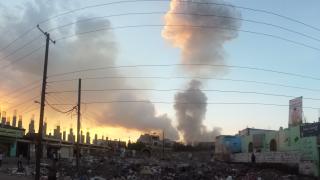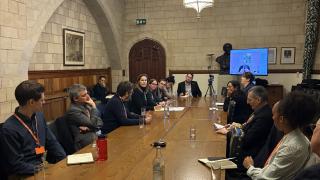
Lord Wood of Anfield, Chair, United Nations Association - UK
It’s difficult to overstate the level of suffering happening right now in Yemen. Cholera is spreading like wildfire, infecting children at a rate of one every 35 seconds. With its infrastructure obliterated, there is no effective health service left to respond. 19m out of Yemen’s 27m population are without access to safe drinking water or sanitation. Put simply, Yemen is the biggest humanitarian crisis the world faces.
As a matter of the utmost urgency, all states must use every tool at their disposal to help alleviate the immediate suffering. The UN’s £1.7 billion appeal - launched two months ago - remains just 29%-funded. On the ground, workers are saying it is impossible to get aid to those in need without reducing levels of violence and stopping the Saudi-led coalition’s blockade.
The UN Security Council has issued a presidential statement concerning the humanitarian situation in Yemen. A presidential statement is an official document of the Council, but does not carry the same power as a resolution. Bolivia currently holds the rotating presidency of the Security Council, but the UK is the lead member on Yemen and we understand they were instrumental in pushing the statement through. The statement is welcome, and calls for important steps to address the worsening humanitarian situation in the country.
We are grateful to the UK for its initiative. But it is worryingly vague on the wider political and security issues from which the crisis stems and says nothing about the flow of arms to the region, including from Security Council member states, which is prolonging and intensifying the conflict
Each country must examine their relationship with the conflict, now well into its third year, and ask themselves; what more could be done to help end hostilities? The UK’s role is as relevant as its conduct is shocking. In addition to its position in the Security Council the UK is a major aid donor. At the same time, since Saudi Arabia intervened in Yemen in March 2015, the UK has licenced over £3 billion of weapons to the Saudi armed forces (including an eye-watering number of bombs), thus supporting an aerial bombing campaign in Yemen described by an independent UN Panel of Experts as responsible for “widespread violations of international humanitarian law” and “devastating to Yemeni infrastructure and civilians”.
This is having a dreadful effect on the rules-based international system, a network of rules and norms on which we all rely, the UK more heavily than most. In particular, this behaviour drives a coach and horses through the Arms Trade Treaty – a binding international agreement ratified by the UK prohibiting the sale of arms that may be used to commit or facilitate serious violations of international humanitarian and human rights law.
But Britain’s rulebook just doesn’t seem to apply when it comes to Saudi Arabia. The UK’s broadly positive reputation in the Security Council is being hit hard by its stance on Yemen. This statement is just the second in the two years of the conflict, and only one substantive resolution has been passed. When you compare the number of Security Council interventions on other conflict-ridden countries over the past two years – Syria, South Sudan or Somalia for example – one is forced to draw the conclusion that the UK is falling far short of its role as the lead member on Yemen. Russia has used the UK’s relationship with Saudi Arabia to justify its own actions in Syria, with other countries making reference to the undermining effect arms sales to Saudi Arabia are having on the Arms Trade Treaty.
The UK is looking more and more exposed on this issue and should urgently reconsider its decades-long relationship of apparent unconditional support for Saudi Arabia: a country that is working to destabilise the region with its embargo on Qatar, is no ally on Syria, supports and exports religious fundamentalism, and is primarily responsible for the catastrophic humanitarian situation in Yemen. The people of the UK are wondering why, given our significant trade relationship and close political ties, our Government seems unable or unwilling to exert a positive influence on Saudi Arabia politically?
The suspension of arms exports to Saudi Arabia is now supported in the manifestos of every single opposition party that sent MPs to the new Parliament. In America, US senators are increasingly concerned for similar reasons. Our allies will start to question our commitment to international peace and security and our adversaries are already using this to justify actions which we fundamentally oppose. Many are exploiting the general lack of adherence to international norms and standards in conflict to deepen the regional crisis and increase the suffering of civilians: Saudi Arabia in Yemen, Russia and Syria in Aleppo, the US in Raqqa.
The Middle East is bristling with weapons and civilians are paying the price. Sending more weapons cannot be the answer. The UK needs to earn its keep on the Security Council or embolden those who perceive Britain’s privileged position on the Council to be anachronistic and illegitimate. Above all, the UK needs to uphold its international obligations and stop giving political and material support to a country playing a leading role in the creation of an ongoing humanitarian catastrophe.
Photo: Air strike in Sana'a. Ibrahem Qasim via creative comms






